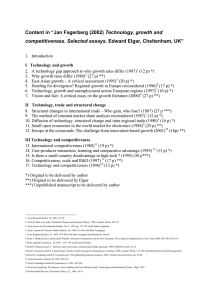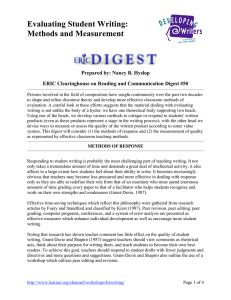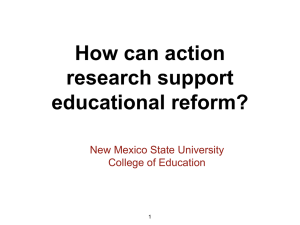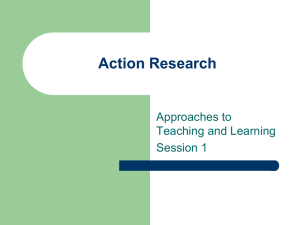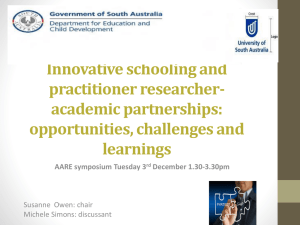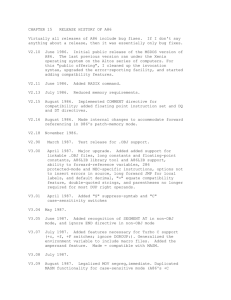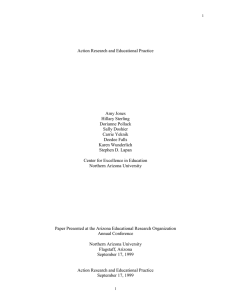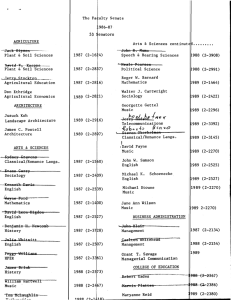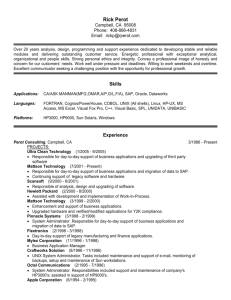What is action research
advertisement
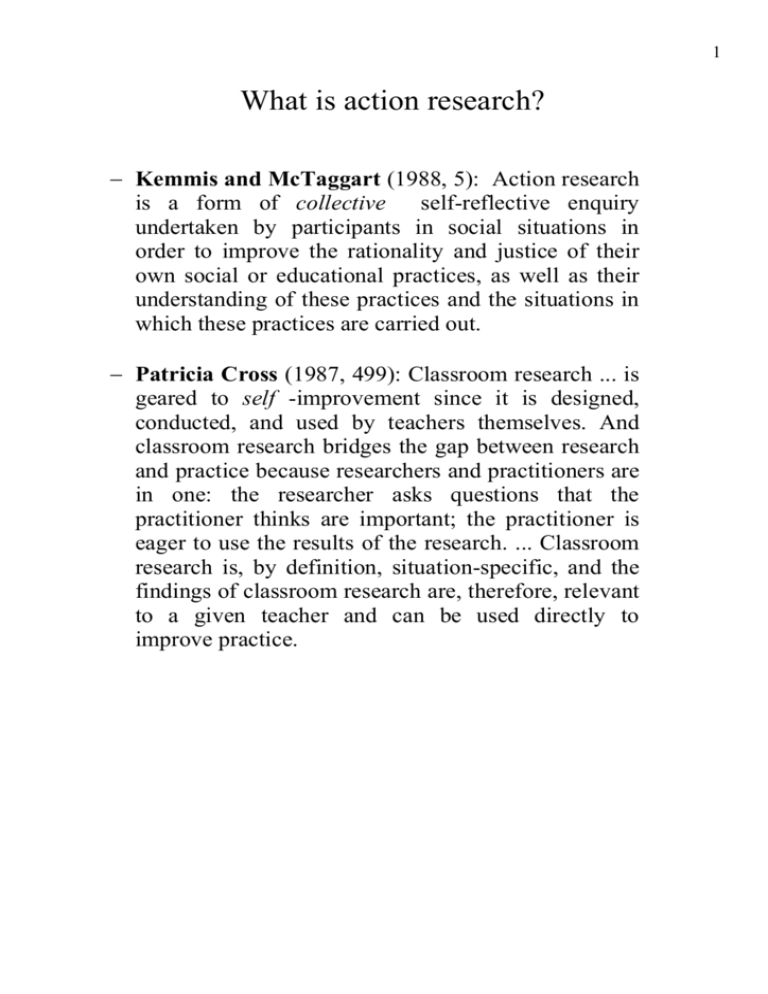
1 What is action research? Kemmis and McTaggart (1988, 5): Action research is a form of collective self-reflective enquiry undertaken by participants in social situations in order to improve the rationality and justice of their own social or educational practices, as well as their understanding of these practices and the situations in which these practices are carried out. Patricia Cross (1987, 499): Classroom research ... is geared to self -improvement since it is designed, conducted, and used by teachers themselves. And classroom research bridges the gap between research and practice because researchers and practitioners are in one: the researcher asks questions that the practitioner thinks are important; the practitioner is eager to use the results of the research. ... Classroom research is, by definition, situation-specific, and the findings of classroom research are, therefore, relevant to a given teacher and can be used directly to improve practice. 2 Key points (Kemmis and McTaggart 1988, 22 - 25): 1. Improving education by changing it and learning from the consequences. 2. Participatory and collaborative: involvement of all participants 3. Self-reflective and spiral: PLAN ---> ACT & OBSERVE ---> REFLECT --> REVISE PLAN --> ACT & OBSERVE -> REFLECT ......... 4. Self-critical: openness to surprises, responsive to unexpected opportunities, aiming at understanding of the relationship between the actions, circumstances and consequences in the given situation 5. Systematic, data/ observation-based: keeping records, collecting observational data (field notes); keeping a personal journal on reflections and learnings 6. Critical understanding of the situations: systematic analysis of observations, building records of changes (in practices, interaction, social relationships, own thinking, ability to monitor the process): long-term developmental perspective to emerge from such records 7. Developing a rationale for what we are doing: justifying our educational actions to others, documenting them by empirical evidence. 3 Potential problems with action research: Is it too much focused on action? too problem-centred? too projectoriented? too academic with regard to the research techniques and consequently too much of a burden to get done by practising teachers? Allwright and Bailey (1991): Classroom research as EXPLORATORY TEACHING: focus on understanding of what goes on in the classroom, both of successes and "failures", posing questions = research perspective to teaching. Teacher: observer + doer + thinker + understander : identify puzzles in work, refine them, identify activities and relate them to puzzles ---> exploit activities for investigative purposes. 4 Why action research/ exploratory teaching? Dissatisfaction tradition: with academic (positivistic) research Research divorced from classroom realities, done by outsiders: getting outsiders (well-intentioned) advice, not insiders' insights; teacher as a "consumer" of knowledge produced by others Ignores learners' prior knowledge, skills, attitudes, beliefs and distracting events: "average" learners and situations are a statistical artefact Ignores learner diversity, differences in processing and learners' attention to teaching, their motivation and effort to learn in a given setting ==> CONTEXT/ SETTING IGNORED: how applicable are statistical "generalisations" to specific contexts? -> education does not take place in a vacuum, but in some unique context (national/ cultural, regional, local, individual classroom, individual learner) ==> Are there universally applicable "laws" in education? There can be global trends or principles, but the PROBLEMS ARE LOCAL and contextual. How to design coherent ways of solving problems in context? What do we see as problems? How to identify them? 5 Allwright, Dick and Kathleen Bailey, 1991. Focus on the language classroom. CUP. Carr, Wilfred and Stephen Kemmis, 1986. Becoming critical: knowing through action research. Victoria, Australia: Deakin University Press. Cross, Patricia, 1987. The adventures of education in wonderland: implementing educational reform. Phi Delta Kappan. Kemmis, Stephen and Robin McTaggart (eds.), 1988. The action research planner. Victoria, Australia: Deakin University Press. Larsen-Freeman, Diane and Michael Long, 1991. An introduction to second language acquisition research. London: Longman. Nunan, David, 1989. Understanding language classrooms: a guide for teacher-initiated action. N.Y.: Prentice-Hall. Richards, Jack and David Nunan, 1990. Second language teacher education. CUP. 6 On Professional Development - Arthur Combs (1988): The causes of people's behavior lie in the people's perceptions or personal meanings — especially in the beliefs we hold about ourselves, the situations we find ourselves in, and the goals and values we seek to fulfill. Changing people’s beliefs is seldom accomplished by force or coercion. Neither is it generally achieved by lecturing, exhorting, ordering, legislation, administrative mandate, or techniques of reward and punishment. To change people’s beliefs requires creating conditions for change rather than imposing reforms. When people encounter problems they feel unable to deal with, they feel threatened. However, when they are confronted with problems that interest them and which they feel able to cope with successfully, they feel challenged. ... If educational reform is to occur from grass roots experimentation, as I have suggested, somehow we must find ways to help our profession believe that “it’s all right to make mistakes,” that not trying is the grievous sin. Teacher confidence to experiment must, once again, be seen as a necessary and desirable characteristic of the profession. 7 Kenneth Goodman (1987, 28—29): Whole language teachers regard themselves as professionals. They draw constantly on a scientific body of knowledge in carrying out their work; they know about language, learning, kids, curriculum, and methodology. They take responsibility for their successes and failures. And they expect to be given the room to use their professional abilities and knowledge. They expect respect from their pupils, their administration, and the public, and understand that respect must be earned by professional conduct. They take pride and pleasure in their work. ... They expect a degree of autonomy in their classrooms, for no professional can function if locked into rigid administratively imposed strictures — in their case, programs, curricula, and materials. Combs, Arthur, 1988. New assumptions for educational reform. Educational Leadership 45:5. Goodman, Kenneth, 1987. What's whole in whole language? Porthsmouth, NH.: Heinemann Educational Books.
